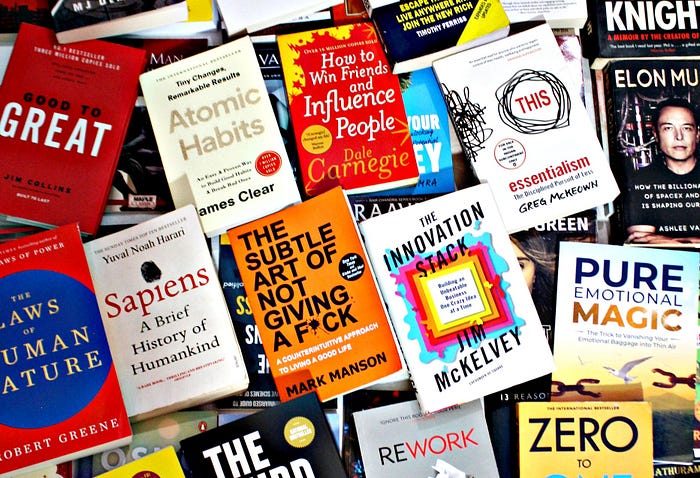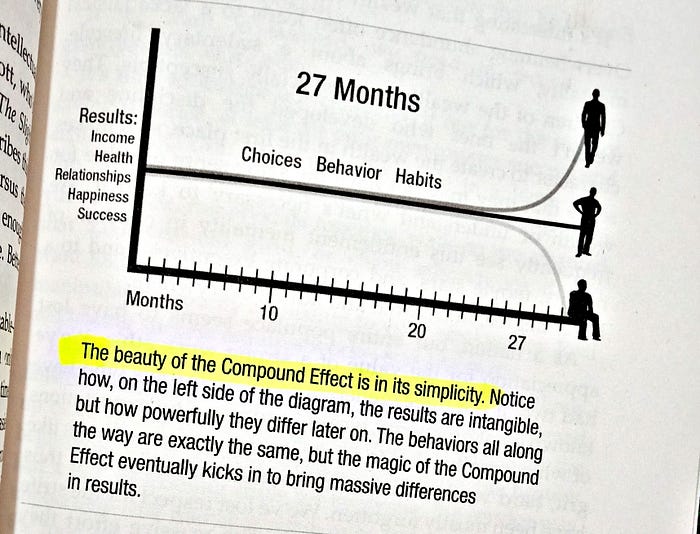I Read 100+ Self-Help Books, And Here’s What I Learned From Them…
5 powerful Lessons after reading 100+ self-help books

Five years back when I was going through a rough patch in my life both emotionally & financially, and during that time books became my friend & my refuge. They have helped me in becoming a better version of myself, changed my temperament towards life, shifted my mindset, and assisted me in almost all areas of my life.
I owe this good life to books and the valuable lessons I learned from them. I wouldn’t be here writing this article if it weren’t for books.
Over the past five years, I’ve read more than 100 books on the self-help genre. And I’ve come to notice that most of them speak and preach the same thing in one way or the other.
But there are some books that are fundamental and all the other books are just extensions of those books.
Here in this article, I’ll be sharing 5 fundamental lessons I learned from reading over 100+ self-help books.
Let’s get started…
1. Get Rid of the Victim Mindset:
We complain about things not being fair and we are fairly certain that no one else truly understands how hard our life really is. We believe that other people are blessed with easier lives and we find all the reasons during our day to make us feel like a victim of our circumstances. Ask the universe the same question every day: why me?
We keep feeding our minds with this monologue and develop a victim mindset. The first step toward improving our lives is getting rid of this victim mentality.

Solution:
One of the ways we can do that is by shifting our perspective and choosing how we respond to our problems and hardships. If your first response after a problem is: Why me? Then switch this question to What I can do about it?
If there’s something we can do about it, then start doing it. Prepare to take the first step. Just the fact that you are working towards the solution rather than fretting over the problem will bring a lot of personal responsibility to our mindset.
Another way of doing it is through gratitude, feeling sorry about yourself is about thinking I deserve better, and gratitude is about thinking I have more than I deserve. Anyone can learn to become grateful by developing new habits.
If you think that bad things happen to you, then create a list of all the good things that have happened to you as well. By doing this you’ll get a realistic sense of the whole situation, some bad things happen to you and but plenty of good things happen to you as well.
2. Quit Running From Your Problems and Fears
As Mark Manson said, “Life is essentially an endless series of problems, the solution to one problem is merely a creation of the next one. Don’t hope for a life without problems. There is no such thing. Instead, hope for a life full of good problems.”
Happiness comes from solving problems not avoiding them, To be happy you need something to solve, happiness is therefore a form of action; it’s an activity, it is something you consistently need to strive for or work on and not something that will be given to you by some magic power sitting in the clouds. Happiness is a constant work in progress.
So if you want to be happy look to solve your life’s problems, and don’t run away from them. Avoiding them will only make them worse and cause guilt & unhappiness within you.

The second thing we shouldn’t be running from is our fears, almost all of our fears can be traced back to our evolutionary past, our fear of being rejected comes from our need to be a part of the community, to have a social life, to belong and to make the world more familiar for our survival. We don’t live in the same environment anymore but we are still caring the same fears.
Action cures fear. Delaying action won’t make your fear disappear it will only increase its power over you and destroys your confidence. Isolate your fear and then take constructive action. Take on your fear one small step at a time, own them so they can’t own you.
3. Stop Trying to Control the Uncontrollable
Most of the problems, anxiety, stress, fears, and chaos comes when we try to control things/situations/people that are outside of our control.
If you learn how to differentiate between the things you can control and can’t control you’ll automatically filter out 99% of the clutter from your mind. Whenever you face a situation or a problem ask yourself:
Is it under my control? If the answer is No then start channeling your energy toward things that you have control over. Because there is no point fretting over a situation where you have no control.

If the answer is Yes, put your brain to use and think about how you can solve the problem, start focusing on the solution and on the things that you have control over.
You have control over your desires, actions, words, perceptions, and intentions. It is our desire to recklessly control everything which makes us miserable.
4. Do Not Expect Immediate Results.
As a generation influenced by social media, we no longer have to wait for anything. We have pizzas at our doorsteps within 30 minutes, we can send instant messages and transfer money in the blink of an eye, and we don’t have to wait a week for the next episode of our favorite show.
We imitate this behavior in other areas of our life. We crave instant solutions, quick fixes, miracle remedies, or a magic potion to fix all of our problems and improve everything in just one swift painless motion.
But so often we fail to realize that life doesn’t work that way, our need for instant gratification and immediate results is hampering our growth in more ways than we can possibly know of.

All the returns in life whether in relationships, money, habits or anything of importance come from compound interest.” — Naval Ravikant
I personally attribute all of the successes that I had in my life to this principle,
We are what we repeatedly do, the path to everlasting success consists of mundane, unsexy, unexciting & difficult daily disciplines.
The process of building chiseled 6-pack abs/ learning a hard skill/ building a startup isn’t exciting, it’s mundane or even boring. Because you got to do the same activities over a long period of time to hone that body/skill/startup.
Every time you see success in life whether it’s materialistic or not, in any aspect be it business, academics, fitness, or relationships it’s preceded by the duration of your consistency. You can’t do things sometimes & expect amazing results it doesn’t work like that.
You can’t eat clean sometimes and expect good results, you can’t lift weight sometimes or work out sometimes, and you can’t be nice to your partner sometimes. A lot of people do things sometimes and expect great results. It doesn’t work that way.
5. Define your “Why”
Many of us are chasing goals that we don’t feel passionate about. We don’t really know why we want them, where did this idea come from? So even after achieving those goals, we feel just as empty inside as we were before achieving them.
This happens because the foundation on which those very goals were laid was not strong enough. We weren’t being true to ourselves all along. And thus our accomplishments feel empty.
Take the time and define your why
“The purpose of your life will come from helping people that are suffering from the same pain that you went through.” — Evan Carmichael
Defining your purpose will not only give you a direction in life but will also keep you internally motivated to keep striving for it even when the odds are stacked against you.
Even when the going gets tough and you are not able to endure the pain, reminding yourself of why you are doing this and why you are gouging through this pain will help you in keeping your head above the water and keep you from drowning.
Thank you for reading till the end and giving your attention to this article.
If you liked reading it, please do clap for it, leave your valuable comment and follow me for more such articles.
